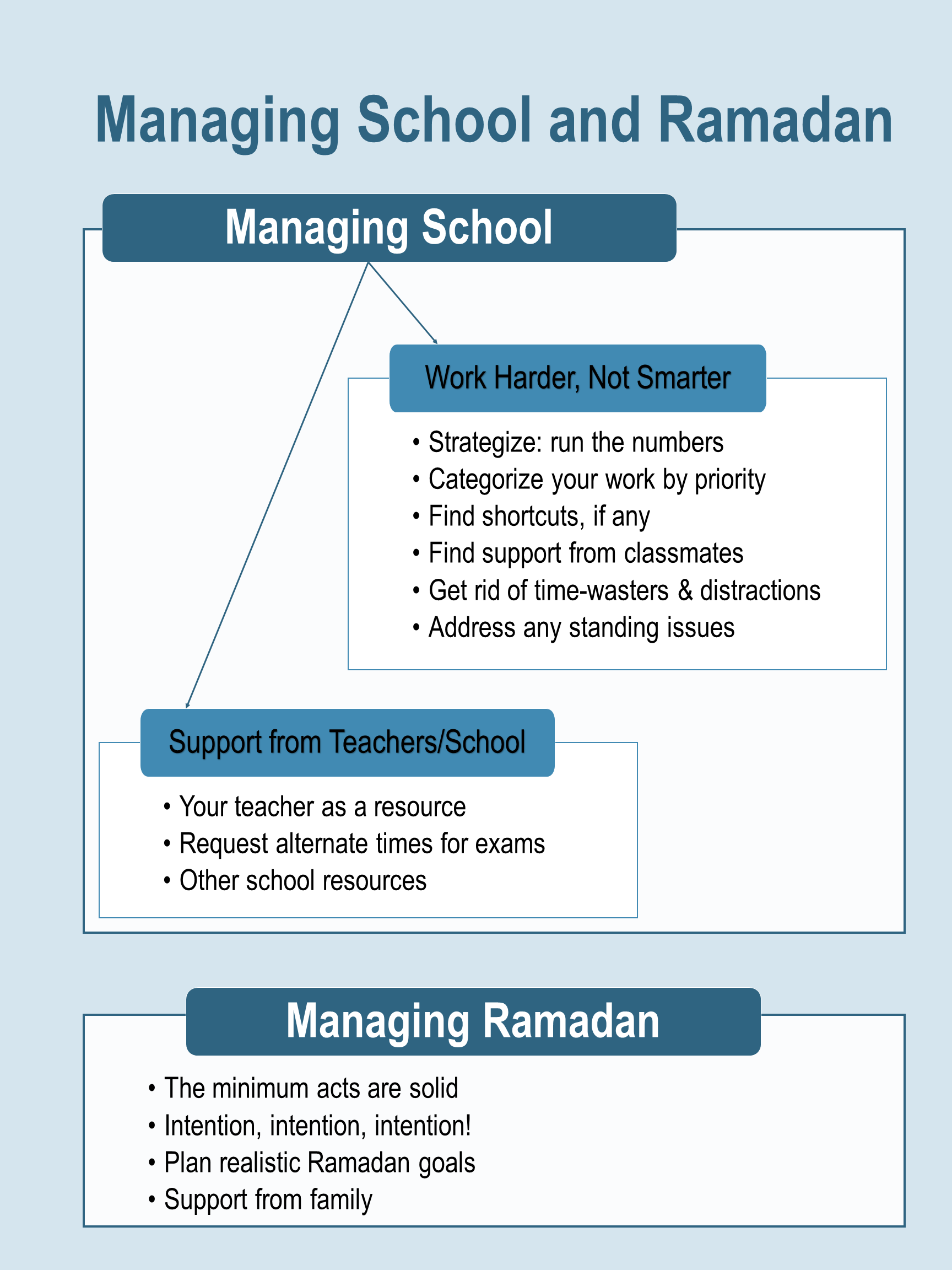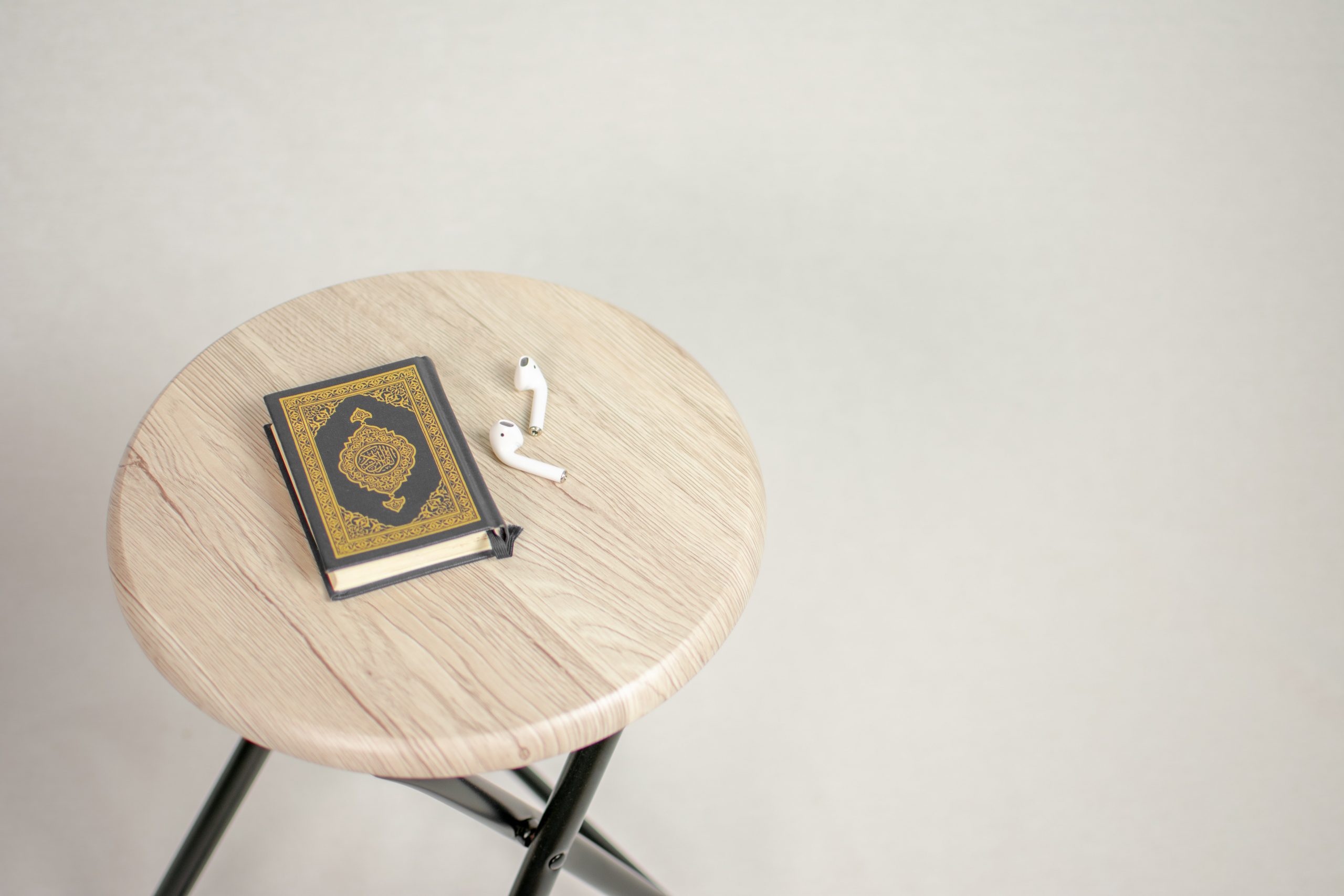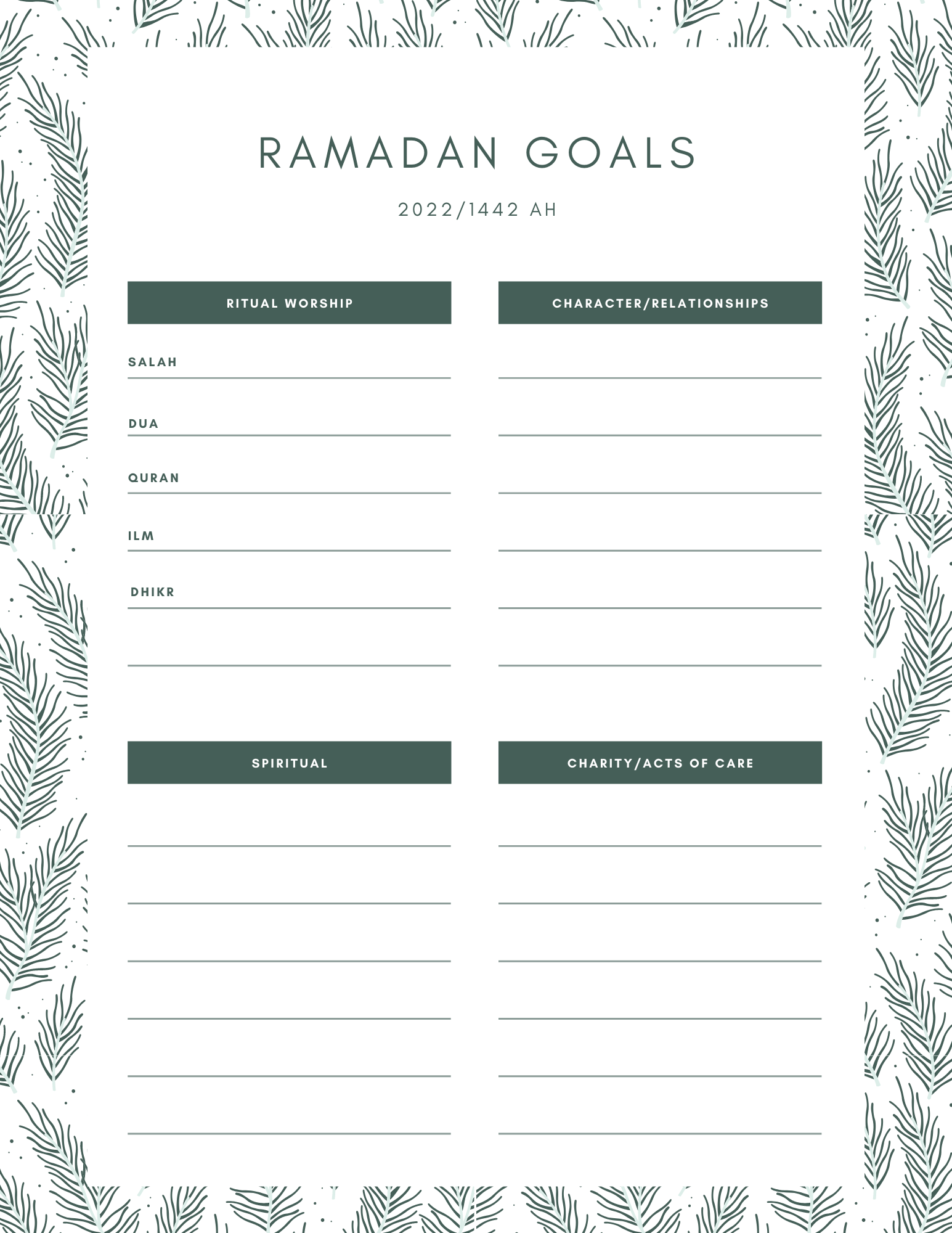#Life
Tips For Managing School And Ramadan

Published

Muslim students this year are facing a challenge, yet again: Ramadan is falling in the school year. This can be particularly challenging for students who are in the last stretch of their academic year, as many schools will likely end their terms a week or two after Eid al-Fitr. How should high school and college students navigate balancing the demands of Ramadan-which are particularly great if students are fasting-with the demands of school? I’m a high school English teacher, and I’ve got some tips for managing school and Ramadan that you to try out this year. Start your planning at least a couple of days before Ramadan is expected to start this year.
Tips for Managing School
Help Yourself with School: Work Smarter, Not Harder

- Tip #1: Strategize: Run the Numbers
Know the grade you want and then play the game well. By this time in the school year or semester/quarter, you should have an idea of how the teacher is grading the class and what work is more important than others. If 50% of your overall grade comes from grades on tests and 5% comes from quizzes, it’s obvious what you should be spending your limited time on. Have a goal for what grade you’d like to get, and then work towards that. Perhaps your goal of getting a B+ is not going to be feasible or will demand more work than you’re willing to put in with Ramadan going on–well, can you lower your expectations to a more realistic B or B-?
Keep supporting MuslimMatters for the sake of Allah
Alhamdulillah, we're at over 850 supporters. Help us get to 900 supporters this month. All it takes is a small gift from a reader like you to keep us going, for just $2 / month.
The Prophet (SAW) has taught us the best of deeds are those that done consistently, even if they are small. Click here to support MuslimMatters with a monthly donation of $2 per month. Set it and collect blessings from Allah (swt) for the khayr you're supporting without thinking about it.
If you have a disorganized teacher or a teacher who is coming up with the numbers as they go, you are disadvantaged here. If your teacher knows exactly how many tests and assignments there will be, you’re much better off playing the numbers game. In cases where you won’t know how many points are going to be available, then try checking in often with your teacher and keep the weight of assignments in mind.
Zoom out and come up with a balance between all of the classes you’re taking, keeping an eye on which ones you’re doing better in and which ones you need to bring up your grade. Is your GPA within your major way more relevant than your GPA overall? Make sure you do better in your major classes and don’t focus as much on the classes which are general requirements or random electives.
It’s against my teaching philosophy to say most of this to you, but–I said it! Most people really only care about grades when it comes to school instead of valuing learning for the sake of learning. That’s a conversation for another time.
- Tip #2: Categorize Your Work by Priority
Tackle your schoolwork knowing which work is high, medium, and low priority. You’ll have to come up with a strategy between what work is the most heavily weighted and which class you need to work the hardest in to get the grade you need. Also factor in time limits, brain functioning, and attention span when thinking of priorities. My suggestion is always go for the more important work first; while that may be a good general rule, you may have to make a call depending on how you’re feeling. Then again, if you’re feeling really down and can’t focus, it may be more worthwhile to take a short nap or shower than waste your time stumbling through an assignment.
- Tip #3: Find Shortcuts, If Any
Are you unnecessarily doing things the slower way when it comes to completing homework? Sometimes the slower way is much better, but maybe you can consider taking shortcuts during Ramadan to help ease the burden of schoolwork.
Do you have to read a book for English class? Can you listen to an audiobook while you read, if that makes things faster for you? Or can you listen while you drive home or take a shower (without sacrificing too much of the quality)? Do you have to turn in everything typed to a teacher? Are you writing by hand first and then typing later? I sometimes do this because it helps me think better, so I get you! Why not just type from the get-go, if you have the resources to do that? Are you a slow typer? Try voice dictation, it could be faster! Do you have to review your class notes from January for your upcoming final? Record yourself reading them and then listen to them while you drive or walk around campus or get groceries. Have you checked out the example problem in your textbook or notes from class before trying to do the work on your own? Is watching a short video from Khan Academy going to help you re-teach yourself, later saving yourself time while completing science or math problems?
- Tip #4: Find Support from Classmates/Friends

- Tip #5: Get Rid of Time-Wasters and Distractions
What do you do in your day which wastes a lot of time? Are there things that are very distracting to you? Which activities do you do that end up killing your productivity? Identify and manage those–whether that means turning off the internet on your phone or deleting apps from your phone or not watching TV in the background while you work at home. I find that multitasking feels like you’re being much more productive, but in actuality it takes longer to do everything if you’re trying to do it all at once. This is only temporary for Ramadan, unless you love your new system, so don’t worry–all the time-wasting and distractions can come right back to you.
I know it is horrible to spend all day in school and then come home and spend all afternoon and night doing homework–the system is cruel and unfair (and often your teachers are caught in this hideousness, too.) Many times I would watch the Food Network or a basketball game in the background to numb myself from the pain of having to do Algebra 2 homework, but this can really slow you down. Can you think of your time in this way: focused work or focused relaxing/fun time? If you want to sit down and relax reading a book for fun or playing a video game or watching a sports game, then intentionally enjoy it and keep parameters on how much you’re indulging in your chill time. Do something you really enjoy instead of just being lazy and reaching for something mind-numbing (like that wretched phone) that doesn’t leave you feeling rejuvenated afterwards.
If activation energy is your main problem (just simply sitting down and getting started is the worst for you), then try this: reward yourself for starting your schoolwork shortly with a short, fun activity (5 minutes) with a set timer and then you must start after that. Or you can try vocalizing your feelings and accepting them or explaining to yourself why these feelings are irrational in some way. Sometimes it helps to just say it out loud to help you get over the hump.
- Tip #6: Address Any Standing Issue
Are you behind in something in your class right now, like before Ramadan starts? Take an inventory of where you stand. If you have missing assignments and your teacher allows for late work, figure it out if it’s worth getting that done and hurry it up and turn it in. Are there any other gaping holes and allowances for you to improve on past assignments? Have you done poorly on a test or project and are there still openings for re-takes or revisions? Are there any extra-credit opportunities you may take advantage of right now, before Ramadan starts?
Support from Your Teachers/School
You don’t have to do it all alone–your teachers and school have plenty of resources you can use to manage having school and Ramadan on your plate at the same time.
- Tip #7: Your Teacher as a Resource
Send an email or letter to your teacher, or have a short discussion with them. Tell them that you’re fasting and give them an idea about how that impacts your daily life and your performance as a student. If you’ve been rude or annoying to them or have been a slob of a student all year not turning things in on time, your teacher is less likely to work with you or care. Do I blame them? Honestly–no. Hopefully you have a good rapport with them to cash in on, or at least hopefully they’re afraid enough of getting into trouble for religious discrimination that they’ll hear you out.

There could be things they may do for you just because it’s Ramadan, like they do for other students with special needs. Maybe you can negotiate less homework with them for minor assignments (as long as this doesn’t negatively affect your learning in the class) like doing every other assignment or doing half of the assignment, or having extended deadlines (this may come back to bite you, though).
If nothing else, perhaps they’ll allow you to use their classroom for a nap during your lunch break?
- Tip #8: Request Alternate Times for Exams or Presentations
If you have to sit for an exam or give a presentation during your fasting melt-down phase in the day, you are going to be disadvantaged. Ask your teacher if there is any possible alternate time to take the exam or give a presentation (perhaps at an earlier period in the day or before school?) You know yourself the best and you know when your fast hits you the hardest. I think most teachers would understand and accommodate you, but if they’re resistant, try explaining this as a serious disadvantage, like a temporary disability, which you’d like accommodations for.
If there are other Muslims at your school, band together and approach the teacher as well as the principal or other administrators. You never know what they may be willing to help you with.
- Tip #9: Other School Resources
Ask for a reminder from your teacher about helpful resources you can use that the teacher or school provide. Look into your after-school tutoring programs, especially if you haven’t used them up to this point in the school year. Have you never gone to office hours or forgotten about the TA for your class? Are there student organizations you can reach out to for extra help? Many times you just need a little push when you’re stuck, or an environment which makes you feel motivated to do your work.
Tips for Managing Ramadan
Of course, Ramadan is one of the most holy and blessed times of year. It is so important that to simply ignore it and carry on with life as normal would be foolish. You must find a balance between striving during Ramadan and striving as you normally do in school. Here are some ways to take advantage of Ramadan while your life is still busy as a student.
The Minimum Acts are Solid

Keep your focus on you and your circumstances. You may see others around you talking about finishing the entire Quran or going to taraweeh every night. That’s all well and good–for them if they can manage it. Allah 
Don’t undersell the importance of praying and fasting the bare minimum required from us. It is truly a lot of good work if you actually think about it. During busier days, don’t put yourself down if the “only thing” you did all day was fast and pray.
Intention, Intention, Intention!
The beautiful thing about Islam is that you can earn good deeds for doing almost anything–exercising, washing dishes, playing with a young child, or obeying traffic laws. The key to unlock this other dimension of life is your intention. You have probably heard this over and over again, but for a good reason. Make the intention for everything you do (that isn’t sinful in nature). I often forget to explicitly do this every time I start something–so a hack I really hope works is making an intention the first thing when you wake up. “Everything I do for school today is for Your sake. Anything I do to help myself or my family today is for You. When I rest or relax, it’s so that I have enough energy to carry on with my day, for You.”
If we bring this energy of a good intention into every action we do, particularly if we can remember to do that at the beginning of any action–don’t you also think that our activity will have more blessings in it? Won’t we try a little harder to remember that God is there and paying attention to us, which is part of growing in taqwa – the goal of fasting? If I make the intention to pick up a younger sibling from school for the sake of Allah 
Going to school and getting a secular education can rack in the good deeds for you. You can make the intention to:
- obey your parents
- be financially independent one day in order to support your family one day and give charity
- learn important skills to help you give back to the Ummah (like reading critically, presenting information in a coherent way, etc.)
- spend your time doing something useful rather than indulging in useless or harmful activities
These are just a few you can keep in mind and make the intention for. Make a new intention every day! Cover all of your bases.
Plan Realistic Ramadan Goals
Every person has their own situation, so figure out how much time you have to give to worship other than fasting and praying. Keep those goals realistic and easy to accomplish, allowing you the chance to do extra if you’re all caught up with schoolwork. I love to plan macro-goals for Ramadan that I try to tackle the whole month. Check out how I keep it simple with my planning sheet, which you can download here.
If you have thirty extra minutes every day, perhaps you choose to read thirty minutes of Quran every day. If you live a few minutes away from the masjid, perhaps your goal is to go for ‘Asr at the masjid during a study break; you can sit and make 5 minutes of dua’ afterwards before returning home to help prepare dinner for the remaining time (khidmah). Maybe the weekends allow you some more flexibility. Make it a goal to go for taraweeh Friday through Sunday and then focus on your schoolwork other nights once your energy is back–without feeling guilty or upset that you could be doing “something better.”
Also, look for opportunities in your regular schedule to take advantage of. Walking in between classes on large college campuses or driving home, can you make dhikr instead of listening to a podcast? If you’ve stopped watching TV for Ramadan, can you use that time for working towards a Ramadan goal…or maybe just take a nap? If you have extra time in class, instead of talking to friends, can you quickly get some work done? Of course, I know it is exhausting to constantly cram productive things into every free moment of your day, so do this with balance because having down-time is also very important.
Support from Family
If you live at home, what kinds of support can they give you during Ramadan? Is it simply making sure you wake up after you take a nap or pulling you out of bed for suhoor every morning? Is it a parent or another sibling taking over some of your regular chores when you’re busy and stressed out?
Can you also get on the same page with your family? If you’re normally expected to get nothing less than a B in all of your classes, can they have more realistic expectations of you knowing that you’re fasting and it’s hard to fast and close out the semester at the same time? If everyone else goes to the masjid every single night, can you explain to your parents what your demands are and why you need extra time at home to finish your schoolwork? On the other hand, if your parents are adamant against you fasting while keeping up with the demands of school, respectfully inform them you will fast no matter what they say–and get help from elders in your family or a trusted/respected person in the community . Ensure them that you have a plan to deal with all of the extra struggles managing school and Ramadan will bring, and then show them that plan!
Lastly, don’t forget to ask your parents, grandparents, and other elders who have access to superpower du’as for you to pray for you and your success in school when they break their fast. Call around five minutes before sunset if you must to remind them. This is a huge source of blessing and help that may go untapped.
So…School & Ramadan?
The ball is in your court. Set yourself up for as much success as possible managing school and Ramadan concurrently, and may Allah 
Related reading:
– How To Make The Most Of Ramadan In School- Tips For Parents
-Back to School: Ramadan in Public School
Keep supporting MuslimMatters for the sake of Allah
Alhamdulillah, we're at over 850 supporters. Help us get to 900 supporters this month. All it takes is a small gift from a reader like you to keep us going, for just $2 / month.
The Prophet (SAW) has taught us the best of deeds are those that done consistently, even if they are small. Click here to support MuslimMatters with a monthly donation of $2 per month. Set it and collect blessings from Allah (swt) for the khayr you're supporting without thinking about it.
Meena is a writer, podcaster, high school English teacher, wife, and new mom. She loves working with Muslim youth and is interested in literature, arts, and culture. She studied Comparative Literature and Creative Writing at the University of California, Irvine and has a Master’s in Education from the University of Illinois at Urbana-Champaign. She briefly dabbled in Classical Arabic studies in the US and is also studying the Asharah Qira'aat/10 Recitations. Check out her podcast and website Brown Teacher Reads: the brown literature circle you always wanted to be in. (brownteacherreads.com)

You may like

Parenting Through Times Of Fear, Injustice, And Resistance: A Trauma-Informed, Faith-Centered Guide

Recognizing Allah’s Mercy For What It Is: Reclaiming Agency Through Ramadan

[Podcast] Dropping the Spiritual Baggage: Overcoming Malice Before Ramadan | Ustadh Justin Parrott

Far Away [Part 8] – Refugees At The Gate

[Podcast] Guardians of the Tradition: Muslim Women & Islamic Education | Anse Tamara Gray

[Podcast] Should Muslims Ally with Conservatives or Progressives? | Imam Dawud Walid

Op-Ed: From Pakistan To Gaza – Why Senator Mushtaq Ahmad Khan Terrifies Power And Zionism

How to Make this Ramadan Epic | Shaykh Muhammad Alshareef

The Sandwich Carers: Navigating The Islamic Obligation Of Eldercare

Keeping The Faith After Loss: How To Save A Grieving Heart

[Podcast] Guardians of the Tradition: Muslim Women & Islamic Education | Anse Tamara Gray

How to Make this Ramadan Epic | Shaykh Muhammad Alshareef

[Dhul Hijjah Series] Calling Upon the Divine: The Art of Du’a (Part 1)

IOK Ramadan 2025: Four Steps | Sh Zaid Khan

IOK Ramadan 2025: Do Your Best | Sh Zaid Khan
Trending
-
#Current Affairs1 month ago
An Iqbalian Critique Of Muslim Politics Of Power: What Allamah Muhammad Iqbal’s Writings Teach Us About Political Change
-
#Current Affairs4 weeks ago
Op-Ed: From Pakistan To Gaza – Why Senator Mushtaq Ahmad Khan Terrifies Power And Zionism
-
#Current Affairs3 weeks ago
[Podcast] Should Muslims Ally with Conservatives or Progressives? | Imam Dawud Walid
-
#Culture1 month ago
The Muslim Book Awards 2025 Winners









